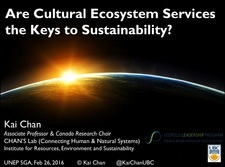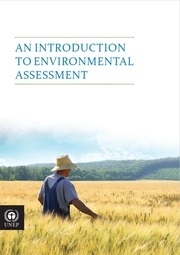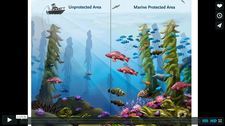Resources
-
Capacity building workshop - Cameroon: national ecosystem assessments using the IPBES process and approaches
This workshop brought together the national ecosystem assessment teams from Cameroon, Colombia, Ethiopia and Viet Nam, with the aim of introducing them to a variety of tools and data for undertaking their ecosystem assessments and be able to initiate their scoping exercise for their assessments. The participants represented both policy-makers and practitioners and came from a range of government departments, regional organisations, universities/research institutes, and NGOs.
Download -
Publication: Anthropogenic Decline of Ecosystem Services Threatens the Integrity of the Unique Hyrcanian (Caspian) Forests in Northern Iran
The first publication authored by Ardavan Zarandian as a result, and output, of his SGA Network mentoring scheme involvement in 2014. The paper is entitled: 'Anthropogenic Decline of Ecosystem Services Threatens the Integrity of the Unique Hyrcanian (Caspian) Forests in Northern Iran'.
Download -
Publication: Modeling of ecosystem services informs spatial planning in lands adjacent to the Sarvelat and Javaherdasht protected area in northern Iran
The second publication authored by Ardavan Zarandian as a result, and output, of his SGA Network mentoring scheme involvement in 2014. The paper is entitled: 'Modeling of ecosystem services informs spatial planning in lands adjacent to the Sarvelat and Javaherdasht protected area in northern Iran'.
Download -
Are Cultural Ecosystem Services Key to Sustainability?
2016 Series: Webinar 1
Speaker: Prof. Kai Chan (University of British Columbia)

In this session the SGA Network Secretariat are joined by Prof. Kai Chan (University of British Columbia) to explore the question 'Are Cultural Ecosystem Services Key to Sustainability?' Cultural ecosystem services’ (CES), long seen as the black sheep among the major classes of ecosystem services, have been gathering great momentum as a topic of study. Yet even still, CES are frequently seen as being of secondaryimportance in environmental protection efforts. Prof. Chan argues that instead that CES are an essential focus for sustainability and environmental protection, both because CES are crucial contributors to human well-being and because they are key to sustainable human-ecological relationships. This webinar reviews the history of research and thinking on CES and considers what such research might imply for the management of ecosystems and of the human-ecological relationships that are key to CES and to future trajectories for humanity on Earth. In light of competing notions of weak and strong sustainability, several propositions are advanced regarding appropriate management for CES and so all ES. Overall CES can be seen as a newly recognized kind of human-natural capital, and as capital-producing: not only do positive experiences and attachment with nature yield both well-being and key capacities, they also yield the stewardship attitudes and identities that may be fundamental to local and global sustainability.
-
Capacity building workshop - Viet Nam: national ecosystem assessments using the IPBES process and approaches
28th September - 1st October 2015, Hanoi, Viet Nam
The SGA Network Secretariat convened a four-day workshop that aimed to build the capacity of assessment practitioners in three countries in the Greater Mekong Sub-region (Cambodia, Thailand, and Viet Nam) to undertake national ecosystem assessments. The workshop was hosted by the Viet Nam Environment Administration, Ministry of Natural Resources and Environment (VEA-MONRE) in Hanoi, Vietnam. The participants, consisting of policy-makers and practitioners, came from a range of government departments, regional organisations, universities/research institutes, and NGOs. Through presentations and exercises, participants were introduced to the key stages of an ecosystem assessment process, in the context of the IPBES assessment process.
Download -
Capacity building workshop - Ethiopia: national ecosystem assessments using the IPBES process and approaches
24th - 28th August 2015, Addis Ababa, Ethiopia
The SGA Network Secretariat, in collaboration with the Ethiopian Biodiversity Institute (EBI), and with support from UNDP, delivered a four-day capacity building workshop at the UNDP Regional Service Centre for Africa, Addis Ababa, Ethiopia, to participants from Ethiopia, Kenya, Tanzania, Rwanda and Uganda. The aim of this workshop was to build understanding and capacity with regards to conducting and using national ecosystem assessments under the IPBES process and approaches.
Download -
An introduction to environmental assessment

A practical reference resource brochure for all audiences concerned with decision and policy making in regard to the environment and sustainable development. This publication provides an introduction to environmental assessments in terms of why they might be needed, what key questions should be considered in the process of environmental assessment, assessment process and design, and presents information and resources on nice different groups of assessment methods.
Download -
The application of Ecosystem Services Assessment to Marine Protected Areas (MPAs)
2015 Series: Webinar 6
Speaker: Dr Steve Fletcher (UNEP-WCMC)
In this session the SGA Network Secretariat are joined by Dr Steve Fletcher (UNEP-WCMC) to deliver a session focusing on ‘The application of Ecosystem Services Assessment to Marine Protected Areas (MPAs)’. In particular the webinar explores two themes: 1) how ecosystem servicesassessment can be used to support decisions concerning the designation of an MPA; and 2) how ecosystem services assessment can support the identification and choice of management measures within MPAs. To provide context to these points, we focus on several worked examples.
-
Integrating ecosystem services assessment into marine and coastal policy
2015 Series: Webinar 5
Speaker: Dr Steve Fletcher (UNEP-WCMC)

Dr Steve Fletcher delivers a session exploring the role of ecosystem services assessment (ESA) in marine and coastal policy. This includes an overview of why it can be beneficial to include ESA in marine and coastal policy making, how to conduct ESA in such a way as to support its uptake into policy (and management), and the relationship between ESA in stakeholder engagement in a marine context. These themes are explored using worked examples from a variety of recent projects.
-
SGANews Issue 13 – September 2015
